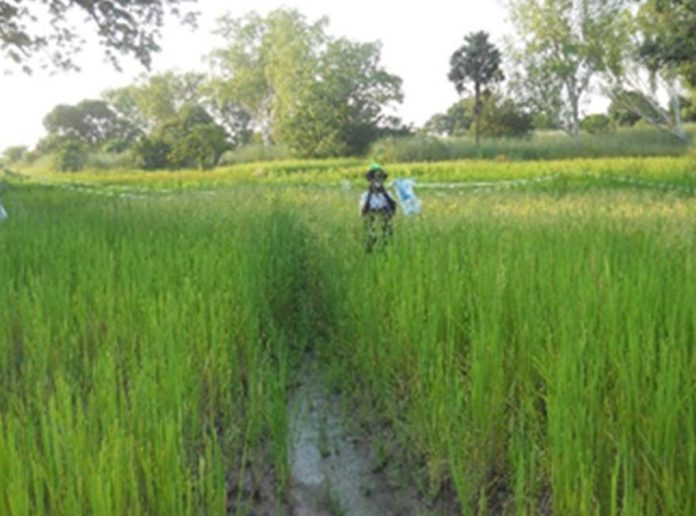By Abdoulie Dibba
The Islamic Development Bank in collaboration with the Government of the Gambia, have commenced a two day consultative workshop on rice value-chain development in the Gambia. The two day consultative workshop started on Monday July 9th 2018 at a local Hotel in Bijilo.
According to the organisers, the workshop is a step towards the funding of a mega rice development project in the Gambia, by the Islamic Development Bank, with co-financing from the African Development Bank and Partners.
In his statement, Momodou L. Ceesay representing the president of the Islamic Development Bank, indicated that the initial estimated investment of the program is US$300 million, of which IDB is expected to finance US$175 million, through the Lives and Livelihood Fund (LLF) and 30% of this amount is a grant.
Ceesay asserted that US$25 million of the estimated investment amount, will come from the contributions of the ten beneficiary countries and US$100 million from development partners; that the project’s direct target beneficiaries is two million households.
Ceesay stated that the majority of IDB member countries in sub-Saharan Africa, have set themselves the goal of increasing domestic rice production to avoid dependency on imports; that because of this, IDB has received official request from many of the member countries on the continent, who have indicated their interest to collaborate with the Bank, to realize this objective.
He said the Program beneficiary countries for phase one include Benin, Burkina Faso, Cote D’Ivoire, The Gambia, Guinea, Mali, Niger, Senegal, Sierra Leone and Sudan and that the objective is to develop effective and proficient national and Regional Rice Value Chain enterprises, with Strong private sector participation. In this regard he said, the program will invest in the following key areas:-
- Infrastructural development,
- Research Science and Technology,
- Development of Value Chains, and
- Capacity building to enhance the enabling policy environment.
“The program is expected to increase rice production and productivity by four fold, increase smallholder farmers’ income by more than 80% and substantially reduce poverty and food insecurity,” he concluded.
In his statement, Ken Johm of the African Development Bank, highlighted the major challenges leading to decrease annual rice yields and productivity. Ken indicated that yield has declined from 1.19 metric tons per hectare in 2010, to 0.85 metric ton per hectare in 2017; that as rice yields decrease by 8% per annum, rice import in the Gambia is increasing at the rate of 4% per annum, in order to meet the growing domestic demand for rice.
Ken noted that reducing the country’s dependence on imports, will require a paradigm shift; that it is for this reason, the Bank is pioneering productivity enhancement through Technologies for African Agricultural Transformation (TAAT), to address this huge issue.
“Having an agrarian economy, the Gambia however imports over 83% of its rice needs. In 2017, the country consumed about 215,000 metric tonS of rice but only produced 36,000 metric tonS leaving a deficit of 185,000 metric tons that was met by imports,” he stated.
Ken stated that in 2017, Gambia earned US$80 million from tourism but spent US $74 million on rice imports.
In her opening remarks Juldeh Ceesay representing the Minister of Finance and Economic Affairs, said the dependency of the country on imports to meet the national rice deficit, is in no doubt to dispose the food security situation in The Gambia, to the vulnerability of volatile global market trends and deplete the foreign exchange reserves.
According to her, the Gambia earns eighty (80) Million US dollars from Tourism in 2017, but spent seventy four (74) million US Dollars to import rice in the same year. This she said indicates, that an increase in rice production will not only ensure food security, but will go a long way in ensuring macroeconomic stability including stability of the national currency; that with the observed trends in the decline of rice production in the country over the years, she urged participants to leave no stone unturned in the first step to solving the country’s rice needs.
She went on to say the result of the forum will have positive impact on the overall national socioeconomic growth, and the ultimate goal of Government to utilize innovative measures to effect a shift from subsistence rice production of today, to a vibrant commercially oriented production system with enhanced value addition.
The crucial roles in the majority of the country’s rice producers who are women, must be central in any process of ensuring rice self-sufficiency; that equally important in the country’s process, are the traditional partners such as UN Agencies, NGOs and CSOs. She expressed gratitude to IDB and ADB for being a reliable partner in the socio-economic development of the country and acknowledged that, it is no secret, rice is our staple food as a country and records have it that on average, every Gambian consumes 117 kg per annum of this staple. This she said, is far above the world average of 56.9 kg per annum; that while we consume that much rice, our national rice production is just about 17%, leaving us to import more than 80% of our rice needs.
‘‘This, is not tenable especially with the New Government that puts people in the center of its development efforts,’’ she concludes.


















